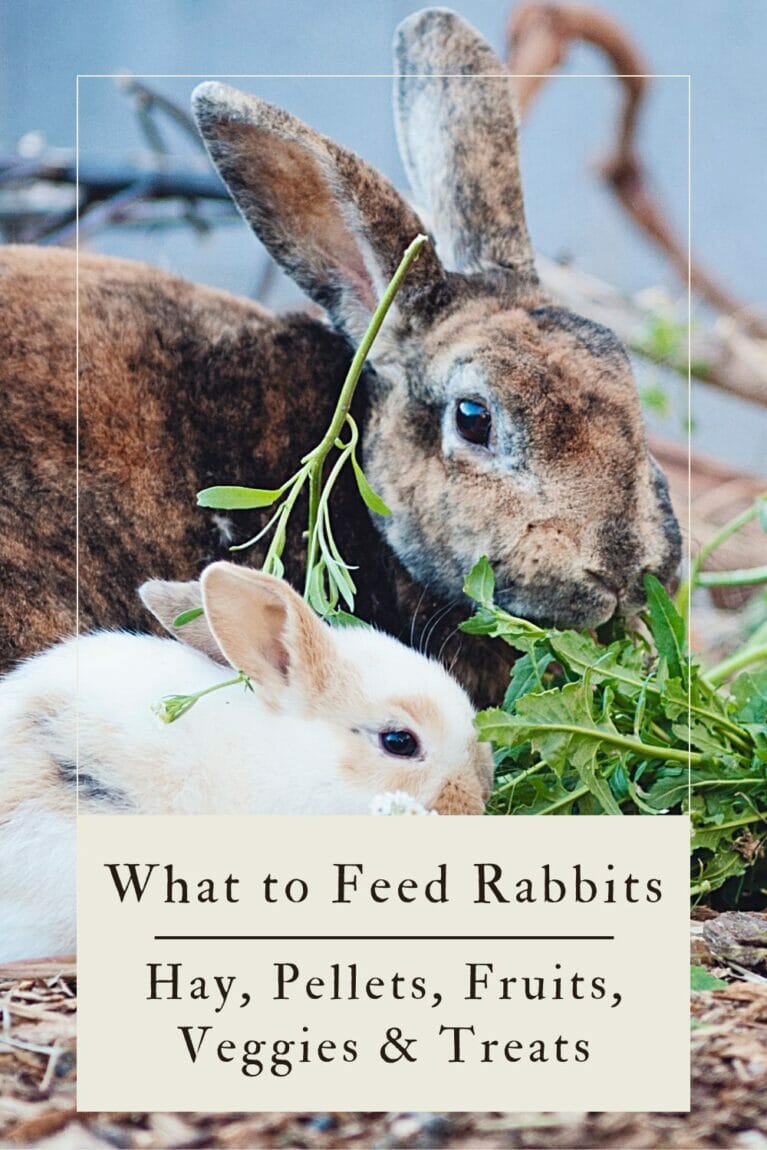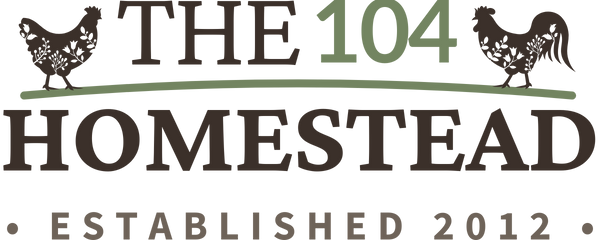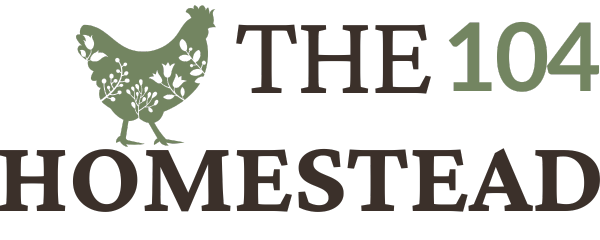What To Feed A Rabbit: Hay, Pellets, Fruits, Veggies & Treats
Are you worried about keeping your rabbit healthy and happy? Learn what to feed a rabbit for a proper diet and what you can give as treats.
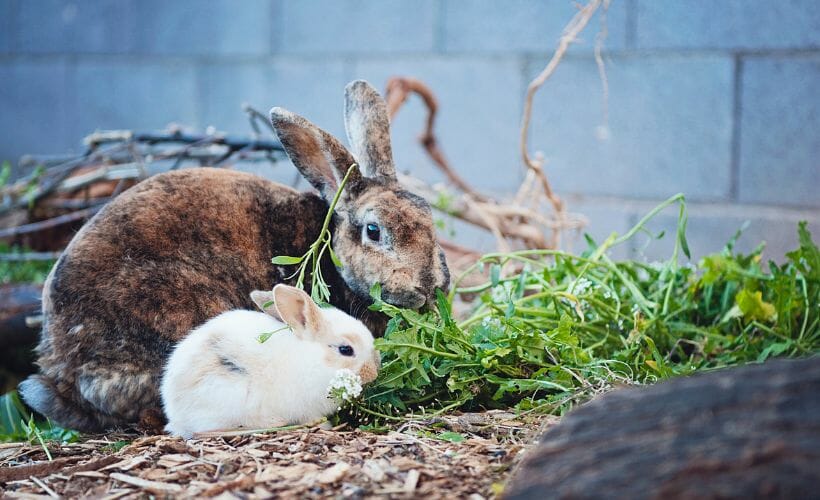
Rabbits are wonderful creatures. They have so much to offer and in the grand scope of things, they require very little care. Rabbits can be kept indoors or in a hutch in the backyard. They come in all sorts of sizes and colors. The fur can be long or short. The reasons for keeping rabbits fall into four major categories: Fiber, showing, meat, and companionship.
Regardless of why you raise bunnies, what you feed a rabbit is a bit more involved than that of a cat or dog. Worry not, though! It’s easy when you get the hang of it.
What Hay to Feed a Rabbit
Hay is the staple of a rabbit’s diet. I’m not going to reinvent the wheel when it comes to describing which grass hay is right for your bunny when The Rabbit House wrote up a great article on Choosing the Best Hay for Your Rabbits. This is a very detailed guide to talk you through the benefits of each type of hay and she even suggests some trustworthy packaged hay options.
When it comes to quantity, rabbits need hay free-choice 24/7. It can be kept in a hay rack or in their litter box.
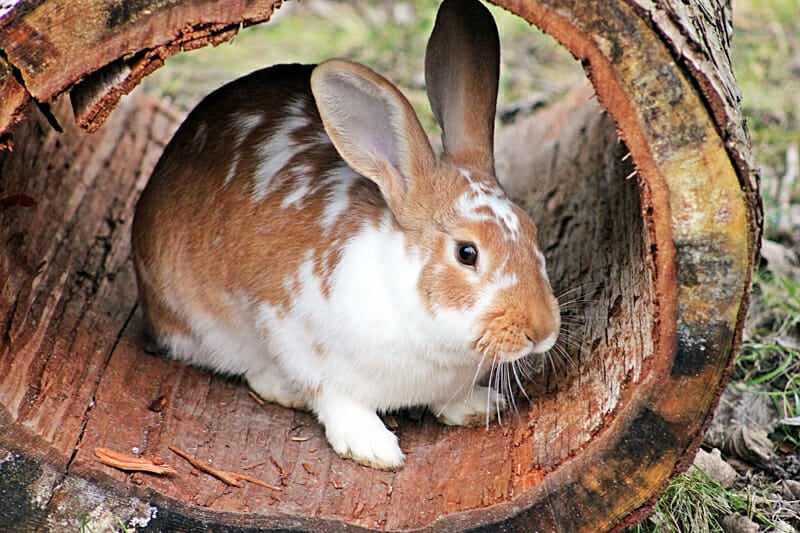
Which Pellets Should You Feed a Rabbit?
Feed pellets in small quantities. They are an accessory to your bunny’s hay diet. Think of pellets like the multivitamins we take. They don’t replace food.
A good quality rabbit pellet should have at least 22% crude fiber, no more than approximately 14% protein, about 1% fat, and about 1.0% calcium. Check the label on the rabbit pellets before you buy. Most commercial pellets are alfalfa-based, which means they’re higher in calories and lower in fiber than timothy-based pellets. Younger rabbits benefit from this higher-calorie diet to support their growing bodies, but adults don’t need as many calories to maintain their weight.
The Tiny Herd has more information on choosing the right pellets for your rabbit and also shares her top 5 picks. See that article here.
Which Vegetables Can You Feed a Rabbit?
Vegetables can be given to your rabbit every day. If you’re buying vegetables, it’s wise to spend the extra on organic. If you’re harvesting your own wild vegetables or getting them from your garden/yard, make sure the area hasn’t been treated with pesticides or herbicides. Wash all vegetables before giving them to your bunny.
Vegetables containing oxalic acid (aka: oxalates) can put a strain on rabbit kidneys over time. Vegetables that are high in oxalates can be given daily, but should not be a large portion of your rabbit’s vegetable diet. Low oxalate vegetables can be given in the amount of 1 packed cup daily.
High Oxalate Greens
- Beet Greens
- Clover
- Collard Greens
- Mustard Greens
- Parsley
- Radish Tops
- Spinach
- Swiss Chard
Low Oxalate Greens
- Arugula
- Basil
- Bok Choy
- Borage Leaves
- Carrot Tops
- Chicory
- Cilantro
- CucumberLeaves
- Dandelion greens
- Dill
- Endive
- Fennel
- Kale
- Lettuce
- Mint
- Radicchio
- Raspberry Leaves
- Spring Greens
- Turnip Greens
- Watercress
- Wheatgrass
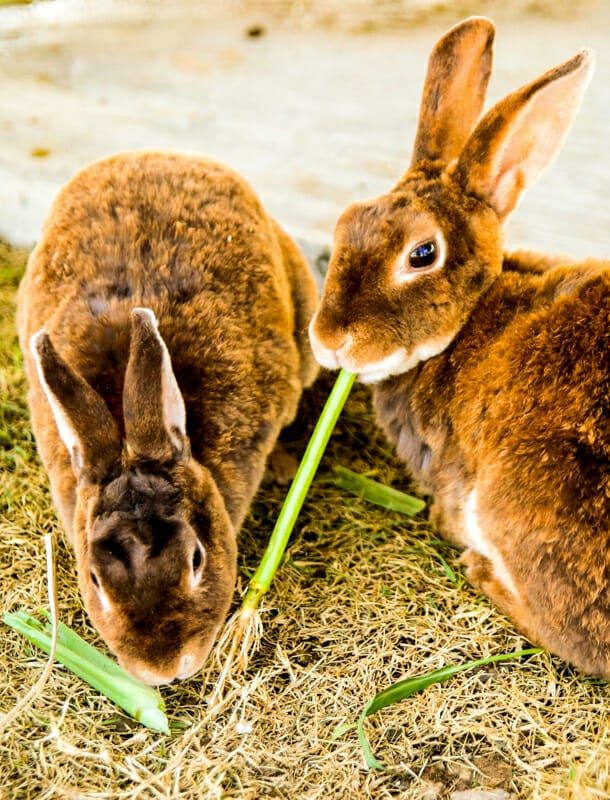
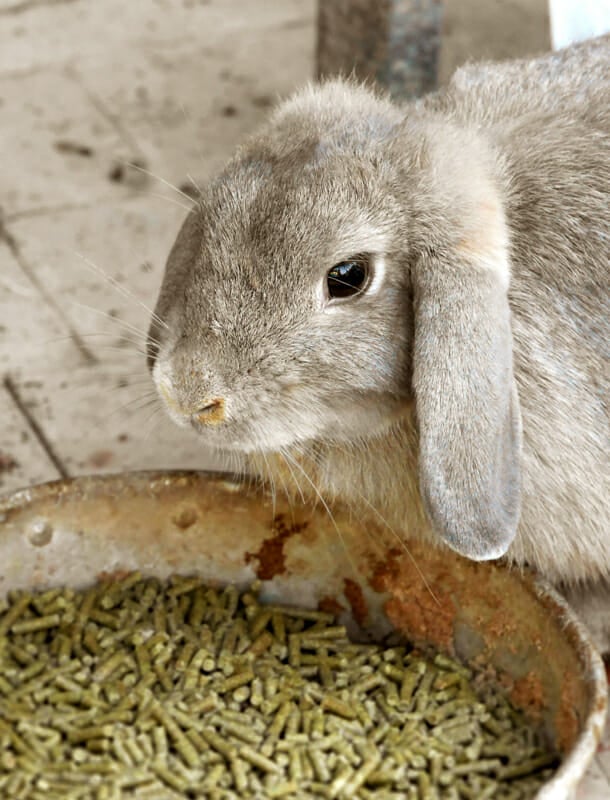
Other Vegetables
These vegetables should be limited to about 1 tablespoon per 2 pounds of body weight daily.
- Bell Peppers
- Broccoli
- Brussel Sprouts
- Cabbage
- Carrots
- Celery
- Cucumber
- Edible Flowers: Roses, Nasturtiums, Pansies, etc.
- Summer Squash
- Tomatoes
- Zucchini
What Fruits Can You Feed a Rabbit?
Fruits can be given to a bunny once or twice per week. Give your bun about 1 teaspoon per 2 pounds of body weight per day.
If you’re buying fruits, it’s wise to spend the extra on organic. If you’re harvesting your own wild fruits or getting them from your garden/yard, make sure the area hasn’t been treated with pesticides or herbicides. Wash all fruits before giving them to your rabbit.
- Apples
- Apricots
- Bananas
- Blackberries
- Blueberries
- Cherries
- Currants
- Grapes
- Kiwis
- Mangos
- Melons
- Nectarines
- Papaya
- Peaches
- Pears
- Pineapple
- Plums
- Raspberries
- Starfruit
- Strawberries
How Often Can You Feed Treats to a Rabbit?
By “treats” I mean prepackaged goodies for rabbits. Feed treats to a rabbit in very small amounts. The healthiest treats for rabbits are dried hay-based treats (such as the Oxbow brand treats). Other treats available to rabbits are chew sticks (like these willow and apple branches). Avoid the cheap treats you may find at your local pet store. Most of these are junk food.
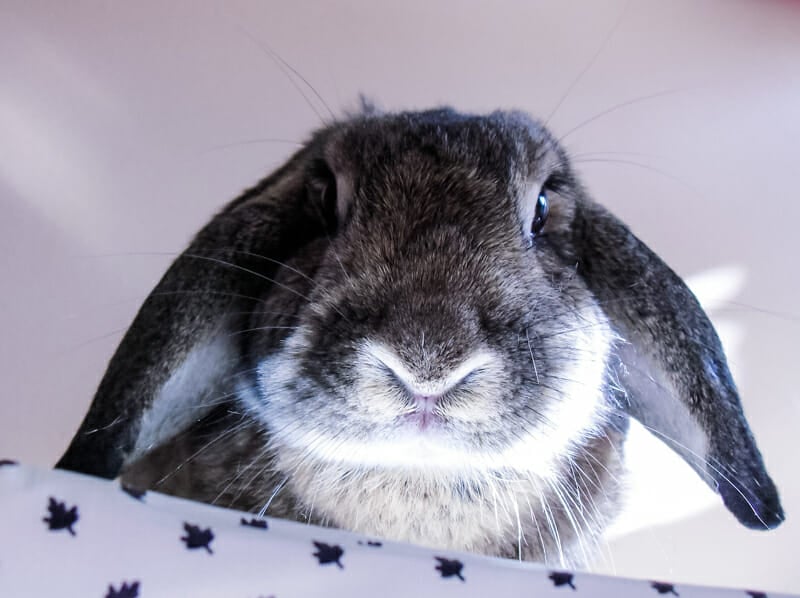
Foods to Avoid Feeding to a Rabbit
Do NOT feed the following, even in small quantities. They are very unhealthy for rabbits.
- Avocado: This contains a compound called persin which can be dangerously toxic to rabbits.
- Beans & Peas (Legumes): These can cause indigestion and gas in rabbits.
- Bread Products (crackers, pasta, pretzels, cookies, etc.): These contain starch, which a rabbit struggles to digest.
- Cauliflower: This causes rabbits to bloat and become gassy.
- Chocolate: This contains fat and sugar and can cause GI stasis, anorexia, and, eventually, liver disease.
- Cereals: These are low in fiber meaning they may lead to GI stasis.
- Corn: This can result in impaction or GI stasis, as well as weight gain and cecal dysbiosis.
- Grains: These are low in fiber meaning they may lead to GI stasis.
- Nuts: These are high in fats and carbohydrates that cannot be digested.
- Potatoes: These are high in carbohydrates and starch, both of which can cause issues for your bunny’s digestive system.
- Rhubarb: This is extremely high in oxalic acid and can cause oral irritation, reduced appetite, and kidney failure.
- Seeds: These are difficult for rabbits to digest and can cause serious digestive problems.
- Sugar: This can cause an overgrowth of bacteria in their gut, throwing their whole digestive system out of whack.
- Yogurt: Contains lactose and rabbits are lactose intolerant.
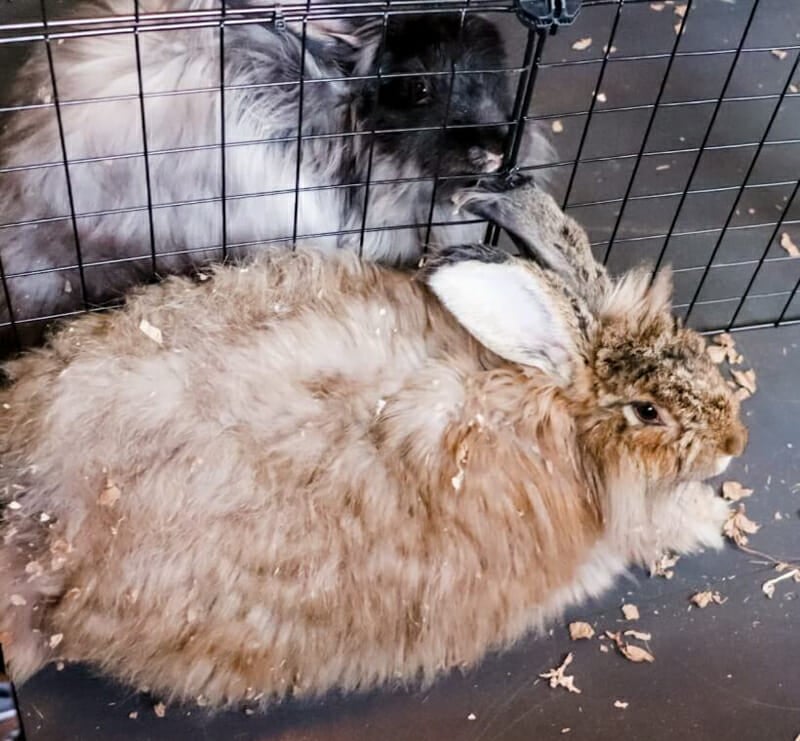
Gastrointestinal (GI) Stasis
One of the most common disorders seen in pet rabbits, GI stasis is a potentially dangerous condition in rabbits, where muscular contractions of the stomach and intestines are reduced and normal bacteria in the digestive tract become out of balance. Rabbits with GI stasis can quickly become lethargic and may exhibit signs of pain such as teeth grinding and a hunched posture. They may also begin to produce excessive gas and sometimes soft stool or diarrhea. If this is left untreated, severe cases of GI stasis can be fatal.
Impaction
A rabbit that has an impaction will be unable to pass food through the digestive tract. As rabbits cannot vomit, food continues to build up in the stomach and intestines. With nowhere to exit the body, this results in painful bloating as the food and feces collect and builds up.
Cecal Dysbiosis
Unlike most other mammals, rabbits produce two types of droppings, fecal pellets (the round, dry ones you usually see in the litterbox) and cecotropes. The latter is produced in a region of the rabbit’s digestive tract called the cecum, a blind-end pouch located at the junction of the small and large intestines. The cecum contains a natural community of bacteria and fungi that provide essential nutrients and may even protect the rabbit from potentially harmful pathogens.
A rabbit suffering from cecal dysbiosis will produce cecotropes that are mushy, pasty, or even liquid. They are usually quite foul-smelling, and often stick to the bunny’s back end in great, nasty clumps.
Kidney Failure
Rabbits produce alkaline urine and rely heavily on their kidneys as the major route of getting rid of any excess calcium within the diet. Rabbits with kidney failure may show a reduced appetite and reduced urine production, which may proceed to a loss of appetite and urine production altogether. The rabbit may become depressed, dehydrated and grind its teeth in a painful manner (bruxism).
Fatty Liver Disease (Hepatic Lipidosis)
Fatty liver disease is caused by an accumulation of excess fat in liver cells. It is usually triggered by anorexia. The loss of appetite happens as a result of many factors, including changes in diet and foods from the “Do Not Feed” list.
Now that you know what to feed a rabbit, you can do snuggle your bun and spoil it rotten with a healthy diet and delicious treats.
